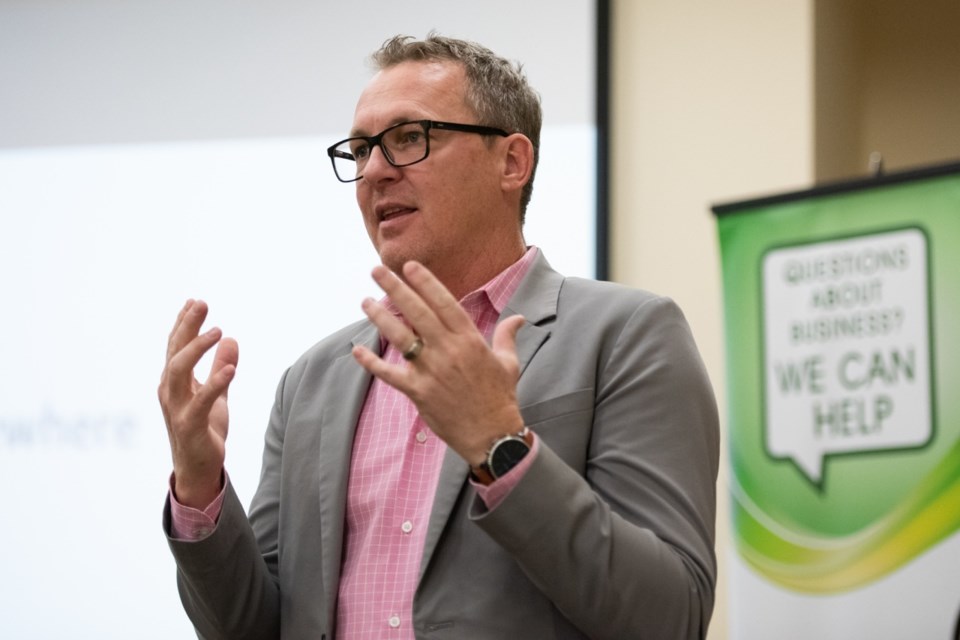Doug Griffiths uses a bit of reverse psychology in hammering home his message on reinvigorating communities. He tells them what to do if you want to kill those communities.
Griffiths spoke in Moosomin on Feb. 10 to approximately 200 people from throughout the region, and repeated the presentation to another 50 in Weyburn on Feb. 12. He did a related presentation to 80 people in Estevan on Feb. 11
The former junior high teacher got the idea from his teaching days. Often kids are told not to get pregnant young, not to drink, not to do drugs, to study, resulting in the tuning out. He instead asked them to list all the things one should do if they want to be a failure by the time they were 45. So the students listed getting pregnant young, drinking, doing drugs, not studying and the like. Realization soon spread across their faces.
Griffiths left politics in 2015 after 13 years as an Alberta MLA and cabinet minister, where he spent a great deal of effort on rural development. He has since built a business as a community growth strategist, helping communities dealing with decline.
His book is 13 Ways to Kill Your Community, and here they are, as presented in Weyburn:
- Forget the water, both quality and quantity.
“People expect good quality water,” he said. Issues like lead contamination aren’t acceptable. Large quantities of water are needed for agriculture, and industry. While the next world war might be fought over oil, Griffiths said, “The last world war will be fought over water.”
- Don’t attract businesses, especially businesses that compete with yours.
Griffiths gave examples of petty small-mindedness in killing competition, which in the end helped no one. Competition in businesses causes communities to grow.
- Don’t engage youth
Griffith said the nature of youth is to go out and explore. Let them go, but give them a reason to come home with all they’ve experienced, he stressed.
Use “boomerang strategies,” which encourage young people to come home a little later in life and set down roots. Encourage them to become entrepreneurs and professionals in your community.
- Deceive yourself
He noted that many communities characterize themselves as “The best place to live, work and raise a family.” Obviously, that can’t be true. Mimicking standard economic development plans like lowering taxes, building a commercial development, and industrial park and a residential subdivision is what everyone does. He stressed you should do something different.
- Shop elsewhere
Every dollar spent in the community touches up to seven other hands, he noted.
Griffiths spoke of the common trend of not supporting local businesses out of jealousy of their owners doing well. “Wishing others failure wishes ourselves failure,” he said.
- Don’t paint
“We’re genetically encoded to be attracted to aesthetically pleasing things,” he said. If your community looks like its dying, people won’t stop there.
- Don’t co-operate
Griffiths gave the example of a community that needed a new hall. Three organization stepped up, but they all wanted to build their own hall, with their name on it, and refused to work together. As a result, nothing was built for 10 years. When they finally got together, it took only a year to get it built.
Similarly, municipalities too often fight over political divisions drawn 120-130 years ago, as if they were little kingdoms, and for what? “Municipalities that work together are successful. Those that remain independent that don’t, fail,” he said.
- Live in the past
Here Griffiths spoke of the dramatic rate of change, particularly technological change, in society, a subject he went into greater detail during the Estevan presentation.
“Ask yourself whether you’ll be relevant,” Griffiths said, chastising those who stand against progress and never want to allow anything new to be built or happen.
- Shut out your seniors
Seniors want quality of life, which includes being involved. He noted there’s often the same 10 people involved in numerous civic groups, as well as running businesses.
It’s important to have housing like condos that is seniors appropriate, not so they stay their all the time, but so that they can lock up and go away for months at a time and not worry about it.
- Reject everything new
“We’ve never done anything like that before,” is a statement to be avoided.
He spoke of how visitors from Japan couldn’t believe how wide and open Alberta’s prairie is, and were thrilled to see it. “We just assume no one else wants to see what we have,” he said.
- Ignore outsiders
Griffiths said that to be an “insider,” not only must one be borne in that town, but their parents, too. He pointed out this is a common but absurd notion.
Rather, “outsiders” should be welcomed because they moved to your community on purpose.
As for immigrants, he said they are often happy to have clean drinking water and good education, something they may not have had before.
“They say this is the land of opportunity, and we spend our time bitching at the coffee shop, asking when somebody is going to do something,” he said.
- Grow complacent
Griffiths used the tortoise and hare fable as example of complacency. “Creating a sustainability strategy” really means the status quo, he said. Instead, communities should seek to be vibrant, aggressive and enterprising. If you don’t do anything, businesses will close and a downward spiral will result.
- Don’t take responsibility
Blame and responsibility are not the same thing, he explained. While bad things happening to your community may not necessarily be blamed on you, Griffiths said, “You’re responsible for how you’re going to handle it.”
Blaming others doesn’t make them responsible for their community, he noted.




